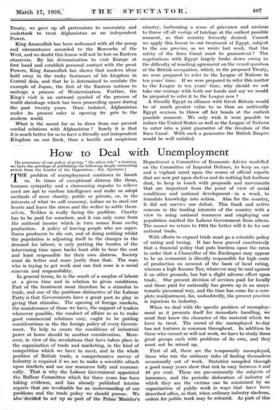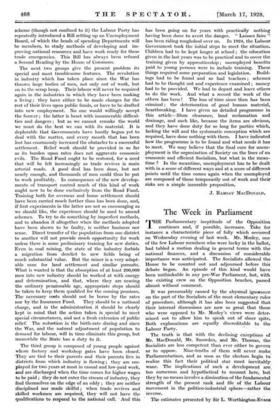How to Deal with Unemployment
[briputsuance of our policy of giving "the other side" a hearing, we have the privilege of publishing the following deeply interesting article from the Leader of the Opposition.—En. Spectator.] _problem of unemployment continues to haunt us.. In times. of exceptional distress like .these, humane sympathy and a clamouring impulse to relieve need are apt to confuse intelligence and make us adopt methods of mere charity, public or private, or, in the interests of what we call economy, induce us to steel our hearts and leave the stress and the welter to settle them- selves. Neither is really facing the problem. Charity has to be paid for somehow, and it can only come from the national income which in turn comes from useful production. A policy of leaving people who are super- fluous producers to die out, and of doing nothing whilst the pOpulation is adjusting itself to the changes in the demand for labour, is only putting the burden of the intervening time upon backs least able to bear the cost and least responsible for their own distress. Society must_ do better and more justly than that. The man who is trying to get work and can find none is a social concern and responsibility.
In general terms, he is the result of a surplus of labour at a- given time and in relation to given conditions. Part of the treatment must therefore be a. stimulus to trade, and one of the positions distinctive of the Labour Party is that Governments have a _great part to play in giving that stimulus. The opening of foreign markets, the Maintenance of those we have, the support of traders whenever possible, the conduct of affairs so as to make good commercial relations easy, ought to be guiding considerations in the the foreign policy of every Govern- ment. To help to create the conditions of industrial peace at home should be another consideration. More- over, in view of the revolutions that have taken place in the organization of trade and marketing, in the kind of competition which we have to meet, and in the whole position of British trade, a comprehensive survey of industry is required if we are to make a scientific attack upon markets and use our resources fully and economi- cally. That is why the Labour Government appointed the Balfour Committee which for three years has been taking evidence, and has already published interim reports that are invaluable for an understanding of our problems and the trade policy we should pursue. We alsoAecicied-to set up- as -part Of the Prime- Minister's Department a Committee of Economic Advice modelled on the Committee Of Imperial Defence; tO keep an eye and a Vigilant mind Upon the scores of official reports that are now put upon shelves and do nothing but harbour dust, to keep in touch with proposals and movements that are important from the point of view of social conditions and national development—in a word, to translate knowledge into action. Alas for the country, it did not survive our defeat. This frank and active concern in the trading interests of the country with a view to using national resources and employing our population marked the Labour Government from others. The sooner we return to 1924 the better will it be for our national trade.
With efforts to expand trade must go a scientific policy of rating and taxing. It has been proved conclusively that a financial policy that puts burdens upon the rates in order that a Chancellor of the Exchequer may appear to be an economist is directly responsible for high costs of production on account of the basis of local rating, whereas a high Income Tax, Whatever may be said against it on other" grounds, has but a slight adverse effect upon trade. Our present division of services paid for locally and those paid for nationally has grown up in an unsys- tematic piecemeal way, and the time has come for a com- plete readjustment, for, undoubtedly, the present practice is injurious to industry.
When we deal with the specific _problem of unemploy- ment as it presents itself for immediate handling, we must first know the character of the material which we have to treat. The crowd of the unemployed to-day has not features in common throughout. In addition to those who cannot or will not work, we have to study three great groups each with problems of its own, and they must not be mixed • up.
First of all, there are the temporarily unemployed, those who run the ordinary risks of finding themselves occasionally out of work. Statistics compiled through a good many years show that risk to vary between 3 and 10 per cent. These are pre-eminently the subjects of insurance, and the periodic dislocation of industry of which they are the victims can be minimized by an organization Of public work in ways that have been described Often, so that, when ordinary industry slackens, orders for *public work may be reletised. As part of this scheme (though not confined to it) the Labour Party has repeatedly introduced a Bill setting up an Unemployment Board, of which the heads of spending Departments will be members, to study methods of developing and im- proving national resources and have work ready for these trade emergencies. This Bill has always been refused a Second Reading' by the House of Commons.
The next two groups give the present problem its special and most troublesome features. The revolution in industry which has taken place since the War has thrown large bodies of men, not only out of work, but on to the scrap heap. Their labour will never be required again in the industries in which they have been making a living ; they have either to be made charges for the rest of their lives upon public funds, or have to be drafted into new employment. No one would willingly accept the former ; the latter is beset with innumerable difficul- ties and dangers ; but as we cannot remake the world we must do the best we can with its material. It is deplorable that Governments have hardly begun yet to deal with the matter, and every month that has been lost has enormously increased the obstacles to a successful settlement. Relief work should be provided in so far as its burden upon rates does not aggravate economic evils. The Road Fund ought to be restored, for a need that will be felt increasingly as trade revives is main arterial roads. A good deal has been done, but not nearly enough, and thousands, of men could thus be put to work profitably. In consequence of the new develop- ments of transport control much of this kind of work ought now to be done exclusively from the Road Fund. Training both for overseas' and home settlement should have been carried much further than has been done, and, if first experiments in the latter are not so encouraging as we should like, the experience should be used to amend schemes. To try to do something by imperfect methods, and to abandon it altogether when the methods adopted have been shown to be faulty, is neither business nor sense. Direct transfer of the population from one district to another will not provide much opportunity for work unless there is some preliminary training for new duties. Even in coal mining, the state of the industry forbids a migration from derelict to new fields being of much substantial value. But the miner. is a very adapt- able man for land settlement and similar pursuits. What is wanted is that the absorption of at least 200,000 men into new industry should be worked at with energy and determination, and that, where they are nearing the ordinary pensionable age, appropriate steps should be taken to keep them qualified for the coming pensions. The necessary costs should not be borne by the rates nor by the Insurance Fund. They should be a national charge, and in the administration it should be clearly kept in mind that the action taken is _special to Meet special circumstances, and not a fresh extension of public relief. The reduetion in the birth-rate during and since the War, and the natural adjustment of population to demand for labour, will in time eliminate this group, but meanwhile the State has a duty to it.
The third group is composed of young people against whom factory and workshop gates have been closed. They are tied to their parents and their parents live in districts from which industry is flowing ; they are em- ployed for two years at most in casual and low-paid work, and are discharged when the time comes for higher wages to be paid ; they do not enter the stream of industry, they find themselves on the edge of an eddy ; they are neither disciplined nor made skilful ; when trade revives and skilled workmen are required; they will not have the qualifications to resioond to -the- national Ca& "And this has been going on for years with practically nothing having been done to avert the danger. "Laissez faire has been riding roughshod over us. In 1924, the Labour Government took the initial steps to meet the situation: Children had to be kept longer at school ; the education given in the last years was to be practical and to cover the training given by apprenticeship ; unemployed benefits paid to young persons were to include training. These things required some preparation and legislation. Build- ings had to be found and so had teachers ; schemes had to be thought out and experience examined ; money had to be provided. We had to depart and leave others to do the work. And what a record the work of the others has been ! The loss of time since then has been criminal ; the deterioration of good human material, heartbreaking. I have given no detailed programme in this article—Slum clearance, land reclamation and drainage, and such like, because the items are obvious; and they have done duty for so long for parties which, lacking the will and the systematic conception which are required, have done nothing with them. I have indicated how the programme is to be found and what needs it has to meet. We may believe that the final cure for unem- ployment is the organization of Society on the lines of an economic and efficient Socialism, but what in the mean- time ? In the meantime, unemployment has to be dealt with in a score of different ways and at a score of different points until the time comes again when the unemployed are composed of those temporarily out of work and their risks are a simple insurable proposition.
J. RAMSAY MACDONALD.











































 Previous page
Previous page